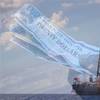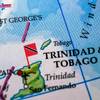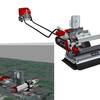VT Halter Marine and NOAA Launch FSV
VT Halter Marine Inc. and NOAA launched the first of four planned NOAA fisheries survey vessels on October 17. Christened Oscar Dyson by Peggy Dyson-Malson, wife of the late Alaska fisheries industry leader for whom it is named, the ship will be one of the most technologically advanced fisheries survey vessels in the world. Senator Ted Stevens (R-Alaska), the scheduled keynote speaker, was unable to attend the ceremony at the VT Halter Marine shipyard in Moss Point, Miss., because of a late-breaking vote on the senate floor. The senator was instrumental in gaining congressional funding for the new ship; his wife, Catherine Stevens, is a sponsor of Oscar Dyson. "Oscar Dyson was a North Pacific fisheries pioneer and an industry leader and a great personal friend,” Stevens said from his Washington, D.C. office. “It is an honor to his memory and for Alaska to have this NOAA research vessel named after him. The community of Kodiak will be proud to have this vessel honoring one of its favorite sons homeported in their harbor.” At the ceremony, retired Navy Vice Admiral Conrad C. Lautenbacher Jr., undersecretary of commerce for oceans and atmosphere and NOAA administrator, announced that NOAA has exercised its contract option with VT Halter Marine Inc. to build a second fisheries survey vessel of the same design for $38.8 million. VT Halter Marine began construction of the new ship (FSV #2) yesterday, kicking it off with a steel-cutting ceremony. FSV #2 will replace Albatross IV in New England, which is more than 40 years old. Approximately 150 VT Halter Marine employees will be working on the two NOAA ships over the next three years. If the additional two planned FSVs are funded, that time span will extend to more than six years. “Improvement of marine fisheries management is one of the President’s four core focuses for the Department of Commerce as well as a NOAA strategic goal,” Lautenbacher said. “Launching Oscar Dyson today and exercising the option for the second vessel are both important steps forward in supporting this goal with modern platforms. These ships will provide higher quality data to fisheries managers about targeted fish populations and the environment that sustains them.” “VT Halter Marine’s unique ability to design and construct sophisticated ‘quiet’ oceanic research vessels such as the Oscar Dyson is recognized globally and affirmed by the fact that NOAA selected us for this very significant program,” said Boyd King, VT Halter Marine chief executive officer. “The Oscar Dyson is a leading edge research vessel with the ability to conduct fisheries research and oceanography simultaneously throughout the world’s oceans.” The christening and launching of a ship is the second major milestone in its construction (the keel laying is the first). Oscar Dyson is expected to be commissioned and become operational in late 2004. The ship, which will not replace an existing NOAA ship, will be home ported in Kodiak, Alaska; its primary mission will be to monitor the Bering Sea and Gulf of Alaska fisheries and ecosystems, particularly the multi-billion dollar Alaskan pollock fishery, one of the nation’s largest. Oscar Dyson is the first of four planned 208 ft. fisheries survey ships to be built by VT Halter Marine that will either augment or replace aging ships in the NOAA fleet. Its capabilities will far exceed those of older NOAA ships. It has been built to meet very specific data collection requirements of NOAA Fisheries, as well as to meet tough standards for a low acoustic signature—an important feature as a quiet ship won’t disturb the fish it is trying to study—set by the International Council for Exploration of the Seas. ICES is a European-based organization that has developed a set of standards to optimize the effectiveness of fisheries research and facilitate international exchange of comparable data. Oscar Dyson and its future sister ships will also be able to do heavy trawling while collecting environmental data, a combined capability unavailable in the private sector. “We’re very pleased with the partnership between NOAA and VT Halter Marine, and expect Oscar Dyson and its sister ships will reflect the quality that VT Halter is known for,” said Lautenbacher. “We are looking forward to the delivery of this new class of ship, as it will help NOAA provide excellent data to our scientists to assess the health of fisheries populations that sustain livelihoods. We’re also glad to be contributing to the economic health of Mississippi through this major contract.” The third planned FSV is expected to replace Oregon II, homeported in Pascagoula, Miss.














